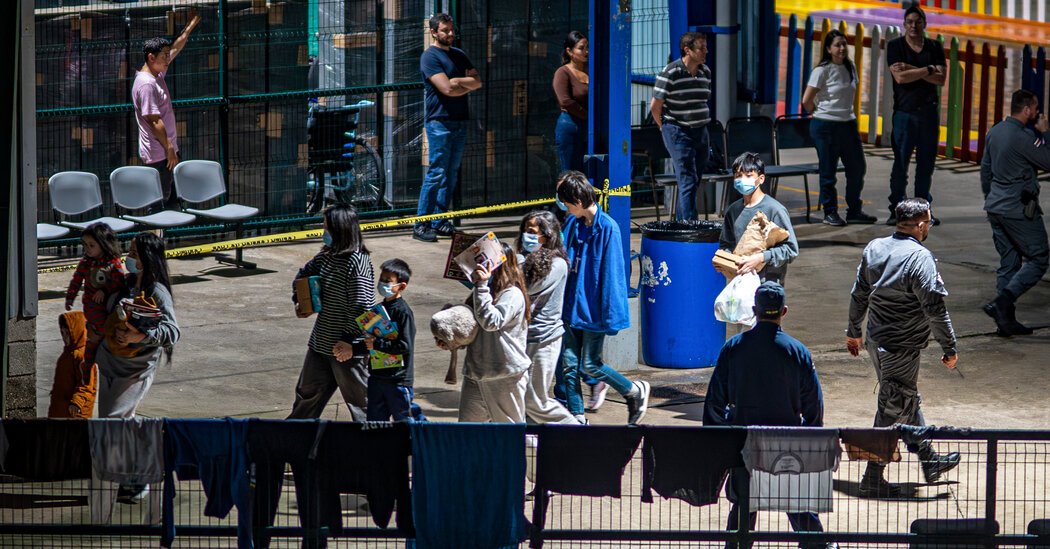Central American countries have long brought back their own expelled citizens from the United States. But now the Trump administration has also called for taking people from other countries around the world.
The extraordinary measures involved in these deportations – hundreds of migrants led by plane without knowing their destinations and their buses to isolated shelters – drew attention to Panama and Costa Rica and the way in which the repression of immigration of immigration Trump takes place far beyond American borders.
Until now, the number of migrants deported to Central America is still small, and it is not clear if it will develop. Regional leaders largely say that they actively cooperate with the United States or have minimized the meaning of deportations. However, analysts warn that these leaders have been supported in a corner with the threat of prices and that any increase in expulsion flights could possibly push Central America to its limits.
“They are powerless to do anything,” said Christopher Sabatini, principal researcher for Latin America at Chatham House, a research institute in London. “And we have seen with the President Petro of Colombia the consequences if you resist: sanctions against diplomatic staff, loss of visa rights, as well as prices.”
This month, the Trump administration sent three military aircraft carrying around 300 migrants – mainly Asia and the Middle East – in Panama. A few days later, a flight carrying 135 people, including almost half of the children and including dozens of Chinese people, Central Asia and Eastern Europe, landed in Costa Rica.
Migrants, who, according to the American authorities, illegally crossed the southern border, must remain in the care of the local authorities until they can be returned to their country or secure asylum elsewhere.
Sending them to other countries abolish many obstacles to which Trump had to face his first mandate by trying to limit illegal immigration, analysts said.
It helps relieve overcrowding in American detention facilities by removing people from countries like China, Afghanistan and Iran, where a lack of diplomatic relations with the United States makes deportations particularly difficult.
In addition, the immediate abolition of migrants allows the United States to bypass international legal obligations to offer people who can deal with deadly conditions in their country of origin the possibility of requesting asylum.
Rapid deportations also allow administration to avoid another obstacle in particular thorny obstacle that Mr. Trump met during his first mandate: under American law, the authorities are not allowed to hold children in detention for more 20 days, let them be with their parents. Among the migrants expelled to Central America so far, a large proportion has been families with children.
In public, the leaders of Central America – clearly concerned about the possibility of reprisals if they challenge the United States – reject the idea that they are forced to accept these migrants.
In Panama, managers are characterized as partners fully engaged in migration. This commitment follows an increase that has destabilized the region in recent years, while hundreds of thousands of people have crossed Panama through the Darién Gap, the perilous jungle corridor between Colombia and Panama.
Costa Rica, for its part, sought to minimize its decision to make people from distant countries. Officials say it as a unique demand from the American government which implies a negligible number of people. They brought their shoulders to the flight of deportees at a press conference last week, bringing together arrivals with other migrants who started south while the United States and Mexico harden the border.
However, President Rodrigo Chaves du Costa Rica was frank about the motivation of his government to receive migrants: “We help the northern powerful brother,” he told a crowd last week, “who” , if it puts a tax on the free commercial areas, destroy us.
Analysts say it is likely that more countries in the region will receive deportees from other countries. Managers of Salvador and Guatemala have already said that they were arranged.
“The biggest problem facing the regional governments willing to do the deportation of Trump is that they have to walk on the stiff rope,” said John Feeley, a former American ambassador to Panama. They must present themselves as “humanitarian societies and rule of the law,” he said, even if they look like “cruel henchmen” from the Trump administration.
Costa Rica and Panama said that with food, clean water and medical care, migrants have the opportunity to request asylum with the help of the United Nations agencies. Local officials were categorical not to return migrants to countries where they say they are faced with a serious danger.
Panamani officials have also said they are not under threat.
“There is no counterpart, no threats,” said Carlos Ruiz-Hernández, vice-minister of foreign affairs in Panama, in an interview. He added that negotiation with the administration on the Panama canal – that Trump claimed to be under Chinese control – is “compartmentalized” from the agreement to conclude migrants expelled by the United States.
Accepting migrant flights is an expansion of an agreement concluded last summer between Panama and the United States to work together to limit migration, from Darién Gap, said Ruiz-Hernández.
Panamani officials also countered the complaint of lawyers there according to which it is illegal under the Panamanian law for the government to hold people for more than 24 hours without order of the court. In the context of immigration, the government has legally “wider powers” to hold people while their migration status is under adjustment, said Ruiz-Hernández.
But the government will probably be faced with repression.
Images like those that appeared in the New York Times, from an Iran migrant, pressed against a hotel window in Panama City, writing “helps” on the glass, blew up the Panama under the spotlight.
A few days later, Costa Rica was the subject of similar control when the country’s mediator’s office published a report indicating that the deported migrants of the United States had arrived in a state of “visible distress”.
Many did not even know in which country they were, according to the report.
Analysts say that it is not clear if these Central America nations get a lot in exchange for their cooperation with the new American deportation approach.
“The truth is that Trump does not offer them anything,” said Sabatini, the expert in Latin America. “Not a development aid, not international investments.”
On the contrary, incentive to cooperation, said Sabatini, seems to protect their economies against reprisals by Mr. Trump, who has shown that he was willing to make high prices, even on close allies.
In the climate of fear around Mr. Trump, appeasement and trying to maintain access seems to be the response of Latin America at the moment, added Mr. Sabatini.
S. Fitzgerald Haney, a former American ambassador to Costa Rica, said the Trump administration’s strategy to deal with the regions of the region was unpredictable.
“Sometimes they will be sticks and sometimes they will be carrots,” he said. “But they really want to approach security at our southern border.”
David Bolaños Reports contributed to San José, Costa Rica, and Julie Turkewitz de Bogotá, Colombia.






